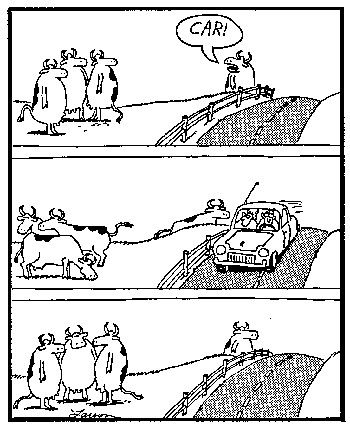On a scale of one to ten, ten being your great-uncle after three martinis and zero being the cloistered Sister Mary Frances, I’m around a three,
maybe a two and half.
There’s a one physical reason I maintain silence over speech and it is simply that my vocal cords are slightly damaged; talking
loud enough for the other party to hear me is difficult. And there’s
my feeble attempt to honor the Benedictine Order’s preference for silence. And then there’s the real reason, which is, when I am talking I
get the impression that the listener doesn't give a rat's you-know-what about
what I have to say, which is understandable because I don’t either most of the
time.
And I might as well add that I have an electro-mechanical defect, that is, my brain
and my mouth are not synchronized very well. It seems there’s a delay between the
thought of a word and speaking the word. A spoken sentence for me is like a four cylinder Volkswagen Beetle sputtering down the road on two cylinders. Add
to that a healthy portion of what is now called “inner dialogue” and I’m just annoying
to listen to.
The golden-tongued have no such delay. My beloved wife, for
an example, can go from zero to sixty words per minute faster
than a Tesla Model S at a drag strip. Thought and spoken word weave into one coherent sentence,
paragraph, and story.
Not that talkers don’t have their difficult members. Who
wants to endure the monologue of the over-talker? Whole paragraphs reside in his
mind waiting to be unloaded on the unsuspecting. He is the proverbial mouth
looking for an ear.
I love a good
conversation when I can really listen to what the other person thinks and why. I
enjoy hearing words formed into sentences. I like the sound of voices. I can
listen to National Public Radio's fund-raising segments even though I am
not concentrating on the words being said. There is a pleasant cadence to the
voices. The same with baseball games broadcast on the radio. There is nothing
quite like the sound of a good baseball play-by-play man talking you through
the game, moving in and out of the silence.
The truth is talkers need listeners and listeners need
talkers. Put two listeners together and the silence can be life-sapping. Two
talkers together remind me of a high school cafeteria food fight: throw
something, duck, repeat.
There is a popular story of two famous non-talking, men of
letters, Samuel Coleridge and William Wordsworth that sums up this listener's
frame of mind. It goes like this:
"Wordsworth goes to visit Coleridge at his cottage, walks in, sits down and does not utter a word for three hours. Neither does Coleridge. Wordsworth then rises and, as he leaves, thanks his friend for a perfect evening." *
Now that is my idea of a good time.
----------------------------------------------------------------
* Roger Rosenblott, Time Magazine essay, the Silent
Friendships of Men
----------------------------------------------------------------
(John, give me a number between 1 and 10.)
----------------------------------------------------------------
(John, give me a number between 1 and 10.)




